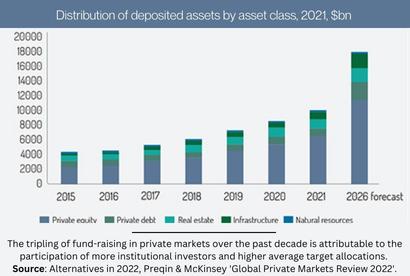New operational systems are available to multi-expertise or specialised asset managers to cope with the growth of private markets. Lyonel Peloponese, head of advanced middle office private market funds services and Romain Mifsud, head of sales & relationship manager French private market, Societe Generale Securities Services, report.
In recent years, the need to diversify sources of return has prompted all institutional and private investors to significantly increase their allocations to private markets. Private equity, real estate, private debt and infrastructure are becoming increasingly important in portfolios. As a result, private equity fund-raising reached a record amount in 2021 at a global level, with $1,200 billion in inflows. Finally, 95% of investors surveyed by Preqin plan to increase their exposure to this asset class over the long term. This fundamental trend naturally has a major impact on the processes of the various players, asset managers and institutional investors. New needs have emerged in order to continue to ensure, in the unlisted world, the full traceability of investment actions and a comprehensive view of exposures.
The challenges of private markets
Upgrading processes in a timely manner: Multi-expertise management companies have all embarked on this shift, gradually enriching their offerings and providing, in this perspective, teams of experts in these types of investments for each of these specific asset classes. At the same time, they must strengthen their resources on so-called middle office activities in order to meet the requirements of their investor clients and regulators. As private markets do not historically correspond to their core business, they are seeking to upgrade their resources in a timely manner while limiting fixed costs, which leads to delegation. In addition, new entrants and light and specialised asset management structures are regularly created. Moreover, these players dedicated to private markets represent a major share of newly created asset management companies. For their part, being focused from the outset on the expertise of their founders, they do not aim to deploy heavy infrastructure. Similarly, institutional investors, who, depending on their degree of maturity on private markets, have more or less opened their portfolios to these assets, also opt for new processes and will delegate their development and implementation to specialised partners.
A role focused on control rather than execution In this context, private equity or real estate fund managers with an in-house middle office found that they had to deal with a rapidly growing workload, particularly in connection with the drawing up of reports or records based on new types of data. Their experience encourages them to question their priorities, their true added value – in practice, the sourcing, fund-raising and management of their holdings – and consequently the need to optimise their organisation by focusing on a role of controlling certain tasks rather than execution. This naturally leads them to seek out partners such as Societe Generale Securities Services, which has built its expertise in contact with major players in the non-listed sector for many years and has developed an “Advanced Middle Office” able to manage various middle office missions on behalf of its clients.
The needs are concrete
Liability management
Needs for managing a fund’s liabilities relate in particular to:
The preparation of KYC (Know Your Customer): KYC provides a record of entry into a relationship with subscribers. If the responsibility for the investor’s KYC falls to the fund manager, the Advanced Middle Office may collect the data used to justify this control with regard to the various types of clients, either from the management company or directly from the investor.
These two possibilities can also be applied in the context of the periodic review of KYC documentation throughout the business relationship in order to meet regulatory requirements: indeed, financial organisations are subject to KYC/AML-FT obligations not only before entering into a business relationship with a client but also throughout the duration of the said relationship.
Management of calls for funds: depending on the commitments of the subscribers, the capital to be called is calculated, then received and each unitholder must be notified. They then receive an inventory of their situation in relation to the fund (amounts already called and any dividends received).
Asset management
Concerning the management of a fund’s assets, the validation of an investment project involves reviewing and gaining knowledge of the target client (KYC) and compliance with the fund’s regulatory and statutory ratios. Then, during the life of the fund, the Advanced Middle Office must record and unwind transactions (holding positions), and oversee the regular publication of the report offering a look-through view of the portfolio. It interacts with each of the stakeholders: custodian bank, valuation agent, statutory auditor, etc.
Current operations also require the intervention of the Advanced Middle Office. The cash policy is defined by the fund manager and its implementation must be accompanied (steering of the target cash balance, transmission of orders to the money market funds registrar, etc). In addition, fees and invoices must be followed up on schedules and then sent to the custodian bank for payment. Within the specific framework of a private debt fund, debt management and coupon payments must also be monitored. Flows are sent to the various stakeholders and monthly reconciliation of positions and flows must be performed.
Reports meeting multiple objectives
In addition, the production of reports, both for investors and supervisors, must meet multiple objectives and therefore adopt different formats:

• The performance report reflects the investment levels indicated in the ratios compared to the data shown in the fund’s liabilities.
• NAV reporting (net asset value) transcribes the current value of all assets held by the fund, debt and equity positions, excluding acquisition and establishment costs (“gross asset value”).
• The management report, carried out at the balance sheet date, meets an accounting and certification requirement to be validated by the statutory auditors. It requires the collection by the Advanced Middle Office, from all contributors, at the end of each financial year, of data illustrating the fund’s activity and results.
• Other reports meet either regulatory requirements (AIFMD, Solvency, etc.) or specific needs of the fund manager and are, therefore, the result of co-construction with the fund manager.
In response to the difficulties of finding and managing talent and the complexity of obtaining a comprehensive service through a single provider with multiple data sources, Societe Generale Securities Services has built a comprehensive and scalable service offering with a single point of entry, thus streamlining information exchanges and meeting the wide range of outsourcing needs.
Find out more about our alternative investment services at securities-services.societegenerale.com
© 2022 funds europe





